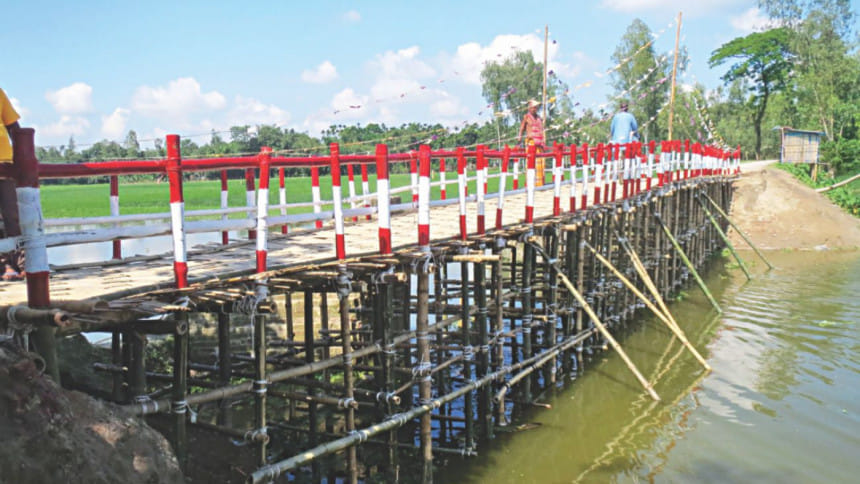A noble initiative

When, on 13 August last, floods caused the bridge across Chhinaye Beel wetland in Kurigram's Rajarhat upazila to collapse, it left 15,000 people from twelve villages without a convenient link to the upazila headquarters and the district town. Realising that any construction of a replacement government-built bridge would take quite a long time, a number of motivated locals set about building a temporary bamboo bridge in its place.
“As the floodwaters receded in the first week of September, some of the locals got together to plan a bamboo bridge,” says Abul Kalam Azad, 35, from Chhinaye Hat village, one of 22 villagers involved in organising the construction project. “We started to collect bamboo and money; and convinced the ex-chairman of Chinnaye union council, Sadequl Haque Nuru, to coordinate the project.”
“Construction of the bridge began in full swing on 8 September,” he continues, “with more than 500 bamboo poles along with money donated by local people. Some villagers helped by providing food to the labourers.”
“It was when I realised that even if the government earmarked funds for rebuilding the fallen bridge in the upcoming fiscal year, the new bridge would still not be completed for at least a year, that I decided to participate,” says the project's coordinator, Sadequl. “None of us, not even the labourers, are bridge construction experts.”
“Our bamboo bridge is 82-foot long and nine-foot wide,” he explains. “It cost Tk 40,000 just for nylon ropes, wire and paint, with a further Tk 30,000 expended on wages for the construction workers. The bridge was completed within 22 days.”
Since the ambitious initiative's opening life for affected villagers has regained some semblance of normality. “I am really happy about this replacement bridge,” says Samiul Haque, a resident of Baroloye village in Barovita union of Phulbari upazila, while crossing the new bamboo bridge. “Many villagers use it to reach Kurigram town and Barobari market.”
“After the permanent bridge collapsed,” says auto-rickshaw driver Rashedul Islam, 23, who is taking passengers across the new bridge as he speaks, “I faced economic hardship for not being able to run my vehicle on its usual route. Now I can.”
“I am glad to have coordinated the project,” reflects Sadequl. “I learnt a lot. I saw what a spirit of community cooperation and volunteering can do, and it's really inspiring. I think these kinds of initiatives could help in other areas that are waiting for permanent bridges to be rebuilt.”

 For all latest news, follow The Daily Star's Google News channel.
For all latest news, follow The Daily Star's Google News channel. 



Comments